#personal essay
Text
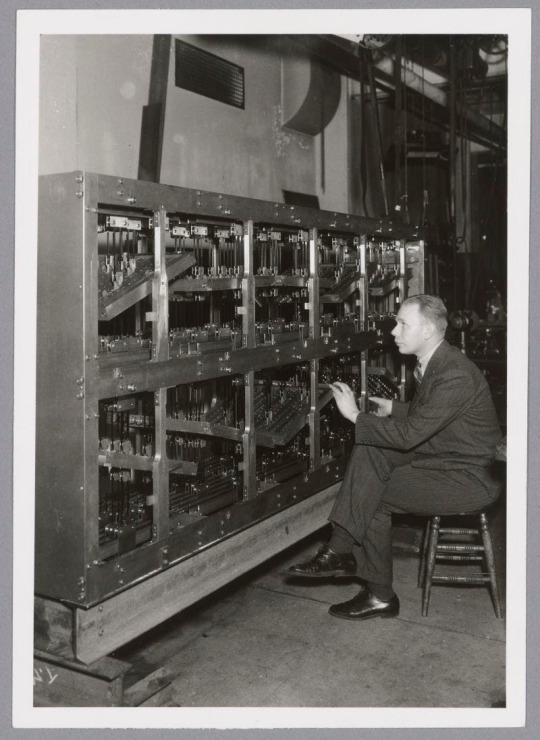
My great grandfather “Bud” Wilbur gave his son Jack an Erector Set one Christmas then took it back the same day. The Erector Set was a children’s toy made of metal pieces that allowed kids to build various model structures like bridges and poorly made bridges. Before video games, children had very few choices for entertainment: marbles, Erector Sets, or becoming a Peeping Tom. Those were the choices. My grandpa Jack was going to be an engineer like his father, and to seal his fate, great grandpa Bud bought him the tools to try his hand at building. Bud, seeing the pieces scattered on the floor must have thought “pearls before swine” while having his eureka moment. Using the toy he had bought his son, he built a model of what he called The Simultaneous Calculator, what the American papers in 1937 called “Robot-Einstein,” and what the Japanese dubbed “The Wilbur Machine.”
He didn’t build the first calculator. I believe that honor technically belongs to the Mesopotamians who made the first abacus. Nor did the calculator conceptually resemble the digital computing systems we have now that employ ones and zeros and a lot of electricity. The Wilbur Machine was an analog computing system with pulleys and brass bars that solved 9 equations simultaneously (or 9x9 systems according to an MIT grad’s thesis that I can only comprehend up to page 4). Math equations that once took a full day to solve now took roughly 1-3 hours. It sped up the production of large structures, power grids, and for one country it seems, planes. It was a big advancement in 1936-37, an advancement that was eclipsed by better smaller machines soon after. In the United States, that is. In Japan, a 3x3 system Wilbur Machine was replicated in the late 30s and a fully functioning 9x9 calculator was completed in 1944 at the Tokyo Imperial University’s Aviation Laboratory.
You read that correctly. My great-grandfather Bud Wilbur built a machine that was stolen by an Axis power right before World War II. Japan continued to use the machine until the war’s end. So, uh…sorry about that? It wasn’t Bud’s intention.
Read the rest of the essay here.
#essays#essay#writing#reading#personal essay#Japan#interesting#travel#science#math#MIT#Wilbur machine#dan wilbur#long reads#movies#family
21 notes
·
View notes
Text
I don’t usually talk about politics on here, if ever. But it’s been almost six months since the conflict in the Middle East flared up again, and I’m finally ready to start. Here are some of my thoughts.
I say ‘flared up’ because this has happened before and it’ll happen again. Because, even though what's currently going on is absolutely unprecedented, those of us who live in this part of the world are used to it. Let that sink in: we are used to this. And we shouldn’t have to be.
But I use that term for another reason: I don't want to accidentally call it the wrong thing lest I come under fire for being a genocidal maniac or a terrorist or a propaganda machine, etc., etc.—so let’s just call it ‘the war’ or ‘the conflict.’ Because that’s what it is. Doesn’t matter which side you’re on, who you love, or who you hate.
This post will, in all likelihood, sit in my drafts forever. If it does get posted, it certainly won’t be on my main, because I'm scared of being harassed (spoiler: she posted it on her main). I hate admitting that, but honestly? I’m fucking terrified.
I also feel like in order for anything I say on here (i.e. the hellscape of the internet) to be taken seriously, I have to somehow prove that a) I’m “educated” enough to talk about the conflict, and b) that my opinion lines up with what has been deemed the correct one. So, tedious and unnecessary though it is, I will tell you about my experience, because I have a feeling most of the people reading this post are not nearly as close to what’s happening as I am.
How do I explain where I live without actually explaining where I live? How do I say “I live in the Red Zone of international conflicts” without saying what I actually think? How do I convey the fear that grips me when I try to decide between saying “I live in Palestine” and “I live in Israel”? I don't really know. But I do know that names are important. I also know that, due to the various clickbaity monikers ascribed to the conflict, it would probably just be easier to point to a map.
I haven't always lived in the Middle East. I've lived in various places along America’s east coast, and traveled all over the world. But in short, I now live somewhere inside the crudely-drawn purple circle.
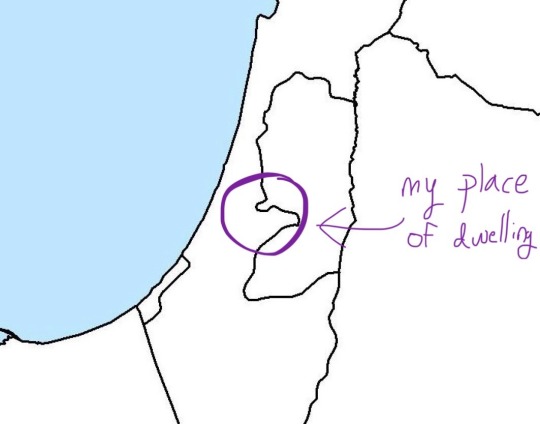
If you know anything about these borders you probably blanched a bit in sympathy, or maybe condolence. But in truth, it’s a shockingly normal existence. I don't feel like I've lived through the shifting of international relations or a war or anything. I just kind of feel like I did when COVID hit, that dull sameness as I wondered if this would be the only world-altering event to shape my life, or if there would be more.
I've been told that, in order for my brain to process all the horrific details of the past six months, there needs to be some element of cognitive dissonance—that falling into a sort of dissociative mindset is the only way to not go insane under the weight of it all. I think in some ways that’s true. I have been terrifyingly close to bus stop shootings when my commute wasn’t over; I have felt my apartment building shake with the reverberations of a missile strike; I have spent hours in underground shelters waiting for air raid sirens to stop.
But. I have also gone grocery shopping, and skipped class, and stayed up too late watching TV, and fed the cats on the street corner, and cried over a boy, and got myself AirPods just because, and taken out the trash, and done laundry on a delicate cycle, and bought overpriced lattes one too many days a week. I have looked at pretty things and taken out my phone because, despite it all, I still think that life is too short not to freeze the small moments.
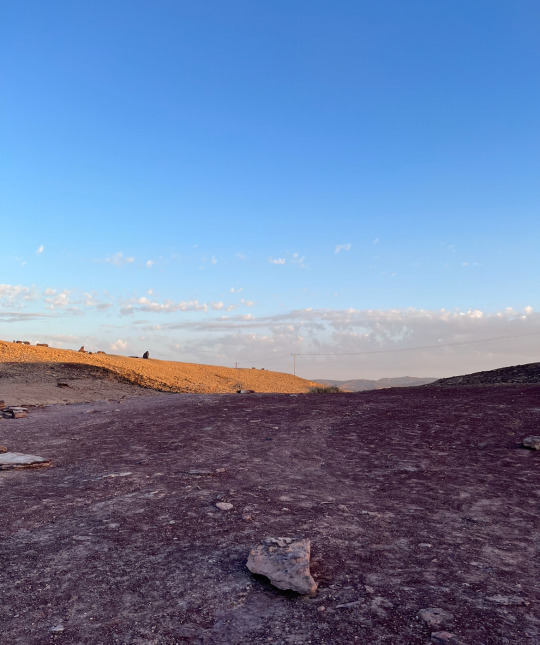
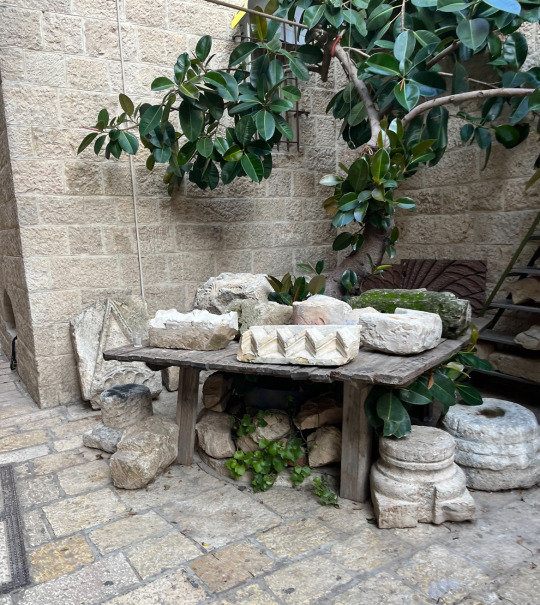
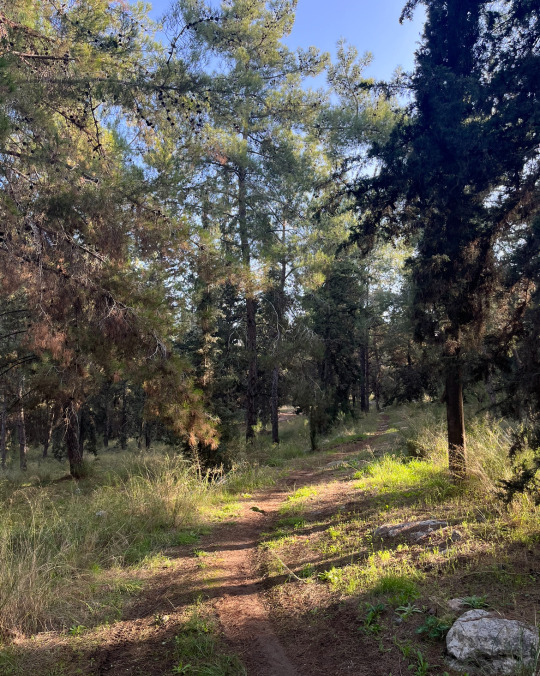
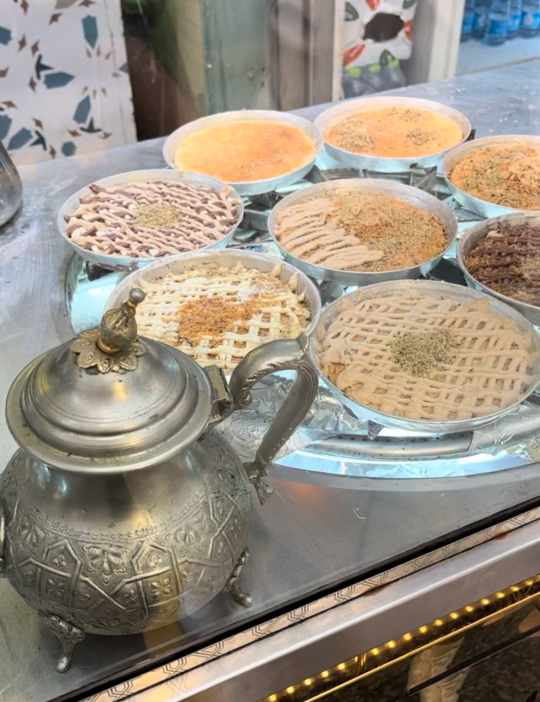

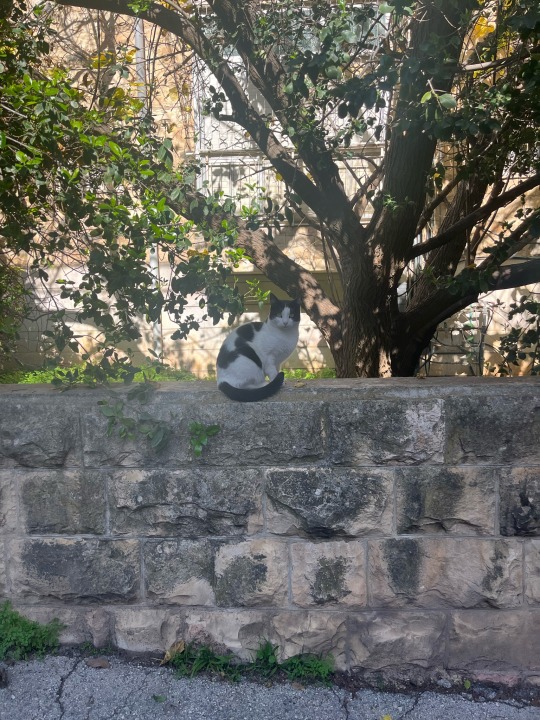
So I'd say, all things considered, I live an incredibly privileged life—compared, of course, to those suffering in Gaza—one filled with sunsets and over-sweetened knafeh and every different color of sand. One that allows me to throw myself into a fandom-induced hyperfixation (or, alternatively, escape method) as I sit on the couch and crack open my laptop to write the next chapter of the fic I'm working on.
But there are bits of not-normalness that wheedle their way through the cracks. I pretend these moments are avoidable, even if they’re not.
They look like this: reading the news and seeing another idiotic, careless choice on Netanyahu’s part and groaning into my morning coffee. Watching Palestinian and Jewish children’s needless suffering posted on Instagram reels and feeling helpless. Opening my Tumblr DMs to find a message telling me to exterminate myself for reblogging a post that only seems like it’s about the war if you squint and tilt your head sideways.
These moments look like all the tiny ways I am reminded that I'm living in a post-October seventh world, where hearing a car backfire makes me jump out of my skin and the sound of a suitcase on pavement makes me look up at the sky and search for the war planes. They look like the heavy grief that is, and also isn’t, mine.
Here's the thing, though. I know you’re wondering when the ball will drop and my true opinion will be revealed. I know you’re waiting for me to reveal what demographic I'm a part of so that you, dear reader, can neatly slap a label on my head and sort me into some oversimplified category that lets you continue to think you understand this war.
No one wants to sit and ruminate on the difficult questions, the ones that make you wonder if maybe you’ve been tinkered with by the propaganda machine, if you might need to go back on what you’ve said or change your mind. We all strive for our perception of complicated issues to be a comfortable one.
But I know that no matter what I do, there will always be assumptions. So, while I shudder to reveal this information online, I think that maybe my most significant contribution to this meta-discussion spanning every facet of the internet is this:
I am a Jew.
Or, alternatively, I am: Jewish, יהודית, يَهُودِيٌّ, etc. Point is, I come from Jews. And, like any given person, I am a product of generation after generation of love.
I'm not going to take time to explain my heritage to you, or to prove that before all the expulsions and pogroms, there was an origin point. If you don’t believe that, perhaps it’s less of a factual problem and more of an ‘I don’t give weight to the beliefs of indigenous people’ problem. But, in case you want to spend time uselessly refuting this tiny point in a larger argument, you can inspect the photos below (it’s just a small chunk of my DNA test results). Alternatively, you can remember that interrogating someone in an attempt to make their indigeneity match your arbitrary criteria is generally not seen as good manners.
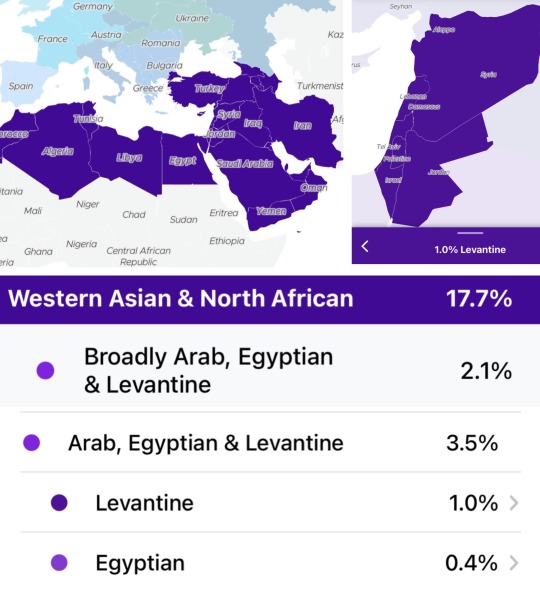
Now, let’s go back to thathateful message (read: poorly disguised death threat) I received in my Tumblr DMs. I think it was like two or three weeks ago. I had recently gained a new follower whose blog’s primary focus was the fandom I contribute to, so I followed them back. I saw in my notes that they were going through my posts and liking them—as one does when gaining a new mutual. Yippee!
Then they sent me this:
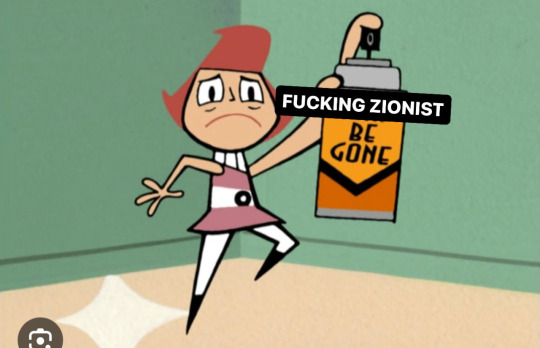
I tried to explain that hate speech is not a way to go about participating in political discourse, but the person had already blocked me immediately after sending that message. Then, assured by the fact that I surely would never see them complaining about me on their blog (because, as I said, they blocked me), they posted a shouting rant accusing me of sympathizing with colonizing settlers and declaring me a “racist Zionist fuck.” Oh, the wonders of incognito tabs.
Where this person drew these conclusions after reading my (reblogged) post about antisemitism…. I'm not actually sure. But I greatly sympathize with them, and hope that they weren’t too personally offended by my desire to not die.
For a while I contemplated this experience in my righteous anger, and tried to figure out a way to message this person. I wanted to explain that a) seeing a post about being Jewish and choosing to harass the creator about Israel is literally the definition of antisemitism and b) that sending a hateful DM and refusing to be held accountable is just childish and immature. But I gave up soon after—because, honestly, I knew it wasn’t worth my effort or energy. And I knew that I wouldn't be able to change their mind.
But I still remember staring at that rather unfortunate meme, accompanied by an all-caps message demanding for me to Free Palestine, and thinking: the post didn’t even have any buzzwords. I remember the swoop of dread and guilt and fear. I remember wondering why this kind of antisemitism felt worse, in that moment, than the kind that leaves bodies in its wake.
I remember thinking, I don’t have the power to free anyone.
I remember thinking, I’m so fucking tired.
And before you tell me that this conflict isn’t about religion—let me ask you some questions. Why is it that Israel is even called Israel? (Here’s why.) Why do Jews even want it? (Here’s why.) But also, if you actually read the charters of Islamist terrorist organizations like ISIS, Hamas, and Hezbollah (among others), they equate the modern state of Israel with the Jewish people, and they use the two entities interchangeably. So of course this conflict is religious. It’s never been anything but that.
But I do wonder, when faced with those who deny this fact: how do I prove, through an endless slew of what-about-isms and victim blaming, that I too am hurting? How do I show that empathy is dialectical, that I can care deeply for Palestinians and Gazans while also grieving my own people?
There's this thing that humans do, when we’re frustrated about politics and need to howl our opinions about it into the void until we feel better. We find like-minded souls, usually our friends and neighbors, and fret about the state of the world to each other until we’ve gone around in a satisfactory amount of circles. But these conversations never truly accomplish anything. They’re just a substitute, a stand-in catharsis, for what we really wish we could do: find someone who embodies the spirit of every Jew-hating internet troll, every ignorant justifier of terrorism, and scream ourselves hoarse at them until we change their mind.
But, of course, minds cannot be changed when they are determined to live in a state of irrational dislike. In Judaism, this way of thinking has a name: שנאת חינם (sinat hinam), or baseless hatred. It's a parasite with no definite cure, and it makes people bend over backwards to justify things like the massacre on October seventh, simply because the blame always needs to be placed on the Jews.
So when a Jew is faced with this unsolvable problem, there is only one response to be had, only one feeling to be felt: anger. And we are angry. Carrying around rage with nowhere to put it is exhausting. It's like a weight at the base of our neck that pushes down on our spine, bending it until we will inevitably snap under the pressure. I’m still waiting to break, even now.
I wish I could explain to someone who needs to hear it that terrorism against Israelis happens every single day here, and that we are never more than one degree of separation away from the brutal slaughter of a friend, lover, parent, sibling. I wish it would be enough to say that the majority of Israelis (which includes Arab-Israeli citizens who have the exact same rights as Jewish-Israelis) wish for peace every day without ever having seen what it looks like.
I wish I could show the world that Israel was founded as a socialist state, that it was built on communal values and born from a cluster of kibbutzim (small farming communities based on collective responsibility), and that what it is now isn’t what its people stand for.
I wish the world could open their eyes to what we Israelis have seen since the beginning: that Hamas is the enemy, Hamas is the one starving Palestinians and denying them aid, Hamas is the one who keeps rejecting ceasefire terms and denying their citizens basic human rights. Hamas is the governing body of Gaza, not Israel. Hamas is responsible for the wellbeing of the Palestinian people. And Hamas are the ones who are more determined to murder Jews—over and over and over again, in the most animalistic ways possible—than to look inwards and see the suffering they’ve inflicted on their own people. I wish it was easier to see that.
But the wishing, the asking how can people be so blind, is never enough. I can never just say, I promise I don't want war.
When I bear witness to this baseless hatred, I think of the victims of October seventh. I think of the women and girls who were raped and then murdered, forever unable to tell their stories. I think of the hostages, trapped underneath Gaza in dark tunnels, wondering if anyone will come for them. I think of Ori Ansbacher, of Ezra Schwartz, of Eyal, Gilad, and Naftali, of Lucy, Rina, and Maia Dee, of the Paley boys, of Ari Fuld and of Nachshon Wachsman. I think of all the innocent blood spilled because of terror-fueled hatred and the virus of antisemitism. I think of all the thousands of people who were brutally murdered in Israel, Jews and Muslims and Christians and humans, who will never see peace.
My ties to this land are knotted a thousand times over. Even when I leave, a part of me is left behind, waiting for me to claim it when I return. But when I see the grit it takes to live through this pain, when I see the suffering that paints the world the color of blood, I look to the heavens and I wonder why.
I ask God: is it worth all this? He doesn't answer. So I am the one, in the end, to answer my own question. I say, it has to be.
Feel free to send any genuine, respectful, and clarifying questions you may have to my inbox!
EDIT: just coming on here to say that I'm really touched & grateful for the love on this post. When I wrote it, I felt hopeless; I logged off of Tumblr for Shabbat, dreading the moment I would turn off my phone to find more hate in my inbox. Granted, I did find some, and responding to it was exhausting, but it wasn’t all hate. I read every kind reblog and comment, and the love was so much louder. Thank you, thank you, thank you. 🤍
Source Reading
The Whispered in Gaza Project by The Center for Peace Communications
Why Jews Cannot Stop Shaking Right Now by Dara Horn
Hamas Kidnapped My Father for Refusing to Be Their Puppet by Ala Mohammed Mushtaha
I Hope Someone Somewhere Is Being Kind to My Boy by Rachel Goldberg
The Struggle for Black Freedom Has Nothing to Do with Israel by Coleman Hughes
Israel Can Defend Itself and Uphold Its Values by The New York Times Editorial Board
There Is a Jewish Hope for Palestinian Liberation. It Must Survive by Peter Beinart
The Long Wait of the Hostages’ Families by Ruth Margalit
“By Any Means Necessary”: Hamas, Iran, and the Left by Armin Navabi
When People Tell You Who They Are, Believe Them by Bari Weiss
Hunger in Gaza: Blame Hamas, Not Israel by Yvette Miller
Benjamin Netanyahu Is Israel’s Worst Prime Minister Ever by Anshel Pfeffer
What Palestinians Really Think of Hamas by Amaney A. Jamal and Michael Robbins
The Decolonization Narrative Is Dangerous and False by Simon Sebag Montefiore
Understanding Hamas’s Genocidal Ideology by Bruce Hoffman
The Wisdom of Hamas by Matti Friedman
How the UN Discriminates Against Israel by Dina Rovner
This Muslim Israeli Woman Is the Future of the Middle East by The Free Press
Why Are Feminists Silent on Rape and Murder? by Bari Weiss
#palestine#israel hamas war#israel hamas conflict#hamas#on war#essay writing#personal essay#rant post#stop terrorism#israel#writing#palestinian lives matter#jewish lives matter#jewish and proud#jewish identity#jewish muslim solidarity#on grief#on religion#antisemitism#anti zionisim#purim 2024#chag purim sameach#judaism#israeli palestinian conflict#am yisrael chai#kvetching#jumblr#mims on middle east#המצב
505 notes
·
View notes
Photo

I Nearly Died Drowning. Here’s What it’s Like to Survive.
Maggie Slepian knew she shouldn’t have been on the water that day, but she wanted to keep up—she wanted to belong.
I knew then that I didn’t want my last few minutes to be full of sadness and regret. If I wasn’t going to survive this, I didn’t want my final thoughts to be berating myself for a bad choice.
It’s OK, I thought. You didn’t mean for this to happen. You are going to die and you should just be grateful for the time you had.
The heavy, black ache in my chest fully replaced the burn. I forced myself to keep my eyes open and watch the sunbeams like I’d seen a thousand times before, when I’d been underwater by choice and could come up for air when I wanted.
Read the full feature at Longreads.
386 notes
·
View notes
Text
The Emotional Reticence of Holmes and Watson
Sherlock Holmes and John Watson, two shy Victorian men, maneuver their vulnerable feelings of affection for one another in an expertly flawed and human manner crafted by Arthur Conan Doyle. First and foremost, I am examining their use of "my dear Watson" (91 times in the canon) and "my dear Holmes" (14 times).
The first time Holmes ever uses "my dear Watson" in the canon, it's actually in a rather sarcastic tone.
"What is your theory, then, as to those footmarks?" I asked, eagerly, when we had regained the lower room once more.
"My dear Watson, try a little analysis yourself," said he, with a touch of impatience. "You know my methods. Apply them, and it will be instructive to compare results." (SIGN)
Note: for The Great Game, this absolutely isn't the first time Holmes has used this phrase, but from the narrative perspective, it is absolutely the first time Conan Doyle put this phrase to paper, which is more relevant to this examination.
Holmes uses this phrase with a touch of exasperation, which even in itself holds some love within it as he encourages his friend to utilise his own beloved methods. And even in this first instance, while Holmes's tone indicates some displeasure, the personal address ensures that it isn't a genuine blow. But the intimacy of "my dear" is quite daunting, isn't it? so Holmes utilises the veil of sarcasm to break the barrier, in the spirit of "look, I've said it now. Now I may go and say it as much as I want."
Oh, and he does. The frequency of 'my dear Watson' slowly builds through the canon and peaks through FINA, HOUN and EMPT. It isn't surprising, considering they hold some of the most critical points in their relationship.
• "My dear Watson, you were born to be a man of action." (HOUN)
• "Not for the world, my dear Watson. I am perfectly satisfied with your company if you will tolerate mine." (HOUN)
• "Then these are your instructions, and I beg, my dear Watson, that you will obey them to the letter." (FINA)
• "My dear Watson, I owe you a thousand apologies. I had no idea that you would be so affected." (EMPT)
It is evident, that it is after this barrier is broken in SIGN, that Holmes feels comfortable to use this address in such a sincere manner. In fact, it is apparent that it is in particularly emotional circumstances that Holmes is more likely to call for Watson through any means at all.
So, how about Watson?
His use of "my dear Holmes" is almost exclusively out of shock or surprise whenever his 'Johnson' claims anything particularly outré. Again, while Watson is in disbelief, and most probably doubtful of Holmes's claims, the personal address softens this blow to say that no real harm is done between them.
• "My dear Holmes," said I, "this is too much." (SCAN)
• "My dear Holmes!"
"Oh, yes, I did." (SPEC)
The first real instance of Watson using this phrase sincerely is in FINA.
"You are afraid of something?" I asked.
"Well, I am."
"Of what?"
"Of air-guns."
"My dear Holmes, what do you mean?"
Holmes is acting more than out of the ordinary to put Watson in some kind of concern and this question comes no doubt more from worry than simple surprise. He even asks again, "but what does it all mean?" which highlights his wish to be by Holmes's side, even in danger.
The first and only instance of a good-hearted affectionate address comes to Holmes in HOUN. However, interestingly, it is only through the written word, in Watson's letters to Holmes from Dartmoor.
• Congratulate me, my dear Holmes, and tell me that I have not disappointed you as an agent.
• Such are the adventures of last night, and you must acknowledge, my dear Holmes, that I have done you very well in the matter of a report.
Watson's method of breaking the barrier is to send it remotely through his pen, which is, after all, much less daunting than saying it directly. It is absolutely worth noting that Watson has also used this language when specifically wishing for praise - it shows us that he feels the closest to Holmes when he is able to follow his own methods.
Conan Doyle shows us the ways insecurities and pressures can collaborate with our most earnest and deepest affections. Holmes and Watson aren't perfect beings, but navigate through their web of reticence and inner desires to find an unspoken but profound dialogue between them.
#acd sherlock holmes#sherlock holmes#acd canon#Sherlockian scholarship#fucking hell I love them so much I will die for them#I'm so normal about the ACD canon fr fr#personal essay
167 notes
·
View notes
Text
I've been trying to do a little cleaning and organizing of my Google Docs, as I do around this time every year, and I came across the essay I'd written about serving jury duty on a civil lawsuit case this year; I'd left it alone for a while because I wasn't sure how cohesive or interesting it was, but I think it's finally in good shape, so I figured I'd post it up.
It's just about my experience of serving on a jury, my feelings about the legal system and restorative justice and disability, and my own ways of coping with the two weeks I spent in the jury box. I thought folks might like to read it.
134 notes
·
View notes
Text
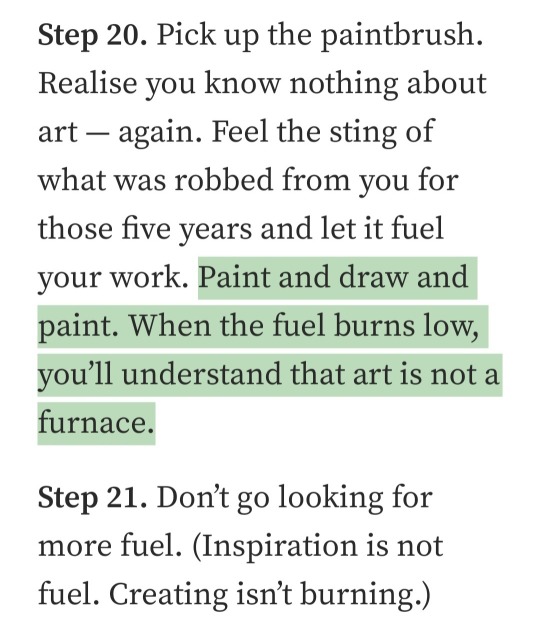
How to Understand Art in Twenty-Five Steps: A Lesson in Ink, Paint and Tears by Holly K on Medium.
205 notes
·
View notes
Text
Ok, so I’m going to finally post this but here’s alenoah the COMPLETE essay: I’m just gonna be talking abt why these two should’ve been canon and showing you my evidence lol. (This is gonna be long so if you’re willing to read this ily)
First of All:
The aleheather plot did not make sense. This is a good ship, I’m not saying it’s bad. But, the volcano scene kinda made it weird. Imagine your confessing to the “love of your life” but then they make you infertile, kick you down a volcano, and are the reason you’re in a robot suit/ traumatized. (Oh but Heather did what she had to do!) LOOK, I’m not saying she didn’t serve in that scene, I’m saying that the fact he was able to brush it off like it was nothing? It just isn’t realistic. Even if he is MADLY in love with her. But then they sacrifice Noah and don’t do anything with him and his unfinished rivalry with Alejandro??
Also I just want to mention the fact that these two would NOT work out after total drama. According to Marco Grazzini (Alejandro’s voice actor, TDWT):

Which I do agree with 😭 I do think that a relationship with 1 narcissist can work (let’s face it, one person in a relationship is more narcissistic than the other. Or not idk.) But if two people are the narcissists in the relationship, it can eventually lead to a break up. Now, you might be wondering why I’m talking about aleheather (understandable). I just wanted to make it clear that I don’t want the aleheather shippers attacking me and how they just don’t really make sense to me as well. And also I don’t want people saying “BUT ALEHEATHER IS SUP-“ stop. (But wait! Shouldn’t you talk about Nemma then?) I’ll get there dw.
Second of All:
Alejandro and Noah had SO MANY weird interactions. No joke. I know a lot of people like to say they didn’t, but trust me, they did. And here’s some proof:
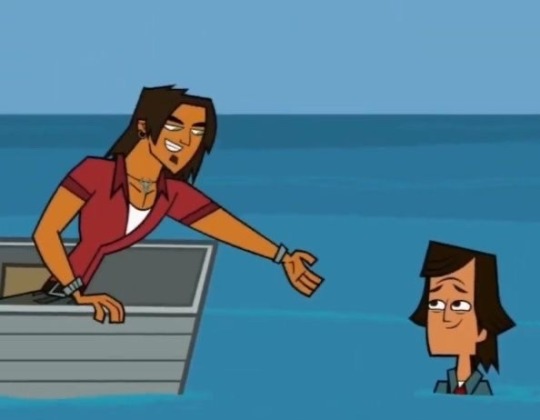
THIS IS NOT A NORMAL LOOK PEOPLE. Honestly, that look on Noah’s face kind of reminds me of som..oh right that’s the exact way he looks at Emma (AKA HIS CANON GIRLFRIEND) this entire interaction was out of nowhere. (Oh but what about the fact that this scene is probably showing how shady Alejandro is) well, every single time a scene like this happens with any other character, we usually get a confessional of Alejandro trash talking them. But did we get that confessional for this scene? In fact, did Alejandro ever directly talk about Noah? NO. NOT EVEN ONCE. Even during London, Alejandro never said one single thing bad about him.
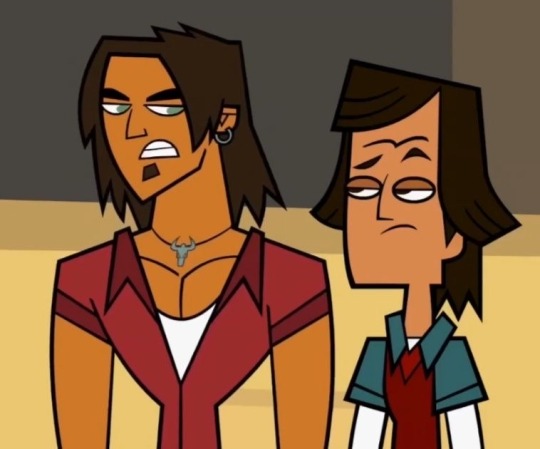
OK SHORT ONE:
The fact that Alejandro mocked Lindsay with NOAH. Alejandro throughout this show has had a fake persona, but then this little comment kind of proved that Alejandro can be himself around Noah. They’re kind of like the same person after all. (I mean that in a “judgy” sense.)
I also want to point out that every challenge (except for London) and every occasion, these two are always next to each other. ALWAYS. They’re always close, they’re always giving each other looks, and tbh it makes so much sense. These two are really the only “sane” ones on team Chris. (Sami, are you SURE they’re always giving each other weird looks?Like-) Child here’s the lil collection:
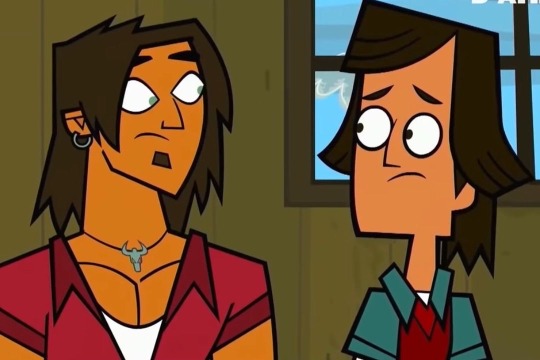

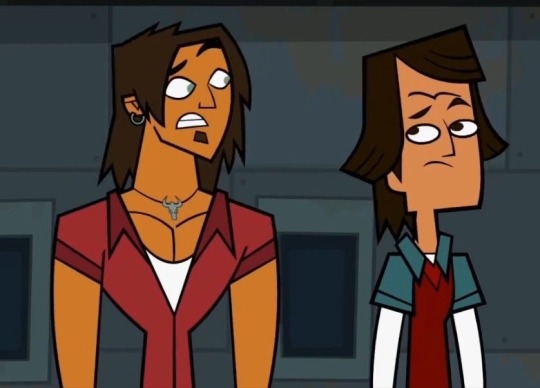
London 🇬🇧 ☕️:
London was probably the most scripted episode EVER. The entire plot for Alejandro and Noah was so bad, it came out of nowhere. (But Sami, Noah didn’t trust Alejandro in ep 7! Don’t you remember?) ofc I remember Susie. It’s just, after ep 7, nothing was done. Like Noah hates Alejandro. That’s it. Then he bad mouths him in ep 13, Noah’s voted out. A lot more could’ve been done but the writers kill off Noah so more drama can start. After all, Noah’s just a side character, right?

THIS. LOOK.
This exact look is hurt. Pain. And any other dramatic thing I can think of. This entire scene just shows how much he trusted him. It’s like, when someone you truly care about, who you trust, backstabs you. They TRULY had something. (But Sami-) Before you even say “he was probably acting” lemme just show you something:

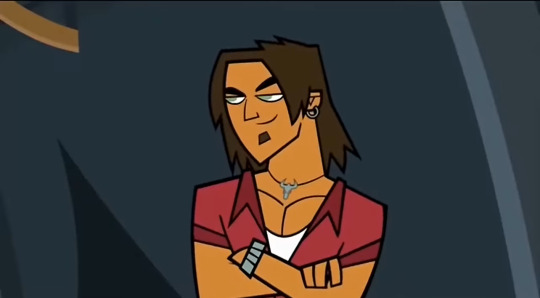
Right when Noah was abt to jump out the plane, he had a shocked look on his face, then realizes the cameras are on him, and quickly changes into a smirk. HE. WAS. NOT. ACTING. He was HURT. And the wasted potential for the rivalry they could’ve had also hurts. But of course, since this was 2010, there wasn’t any lgbtq couples allowed on CN at all ☹️.
FINALLY:
As much as I do love this ship I think that these two will never see the light of day. (Scratch that, they’re def never seeing the light of day.) These two are both in canon relationships, one of which I actually love! #multishipper. Nemma honestly doesn’t have any flaws and there’s really no reason to destroy a pretty sweet relationship. However, during TDWT I’d like to argue the fact that if CN wasn’t homophobic at the time and neither was fresh tv, then these two would’ve definitely been something. It was like fresh tv was trying to give us clues lol. And if the TD writers would’ve let Alejandro and Noah have a rivalry, then there would’ve been a lot more evidence of why these two should be canon.
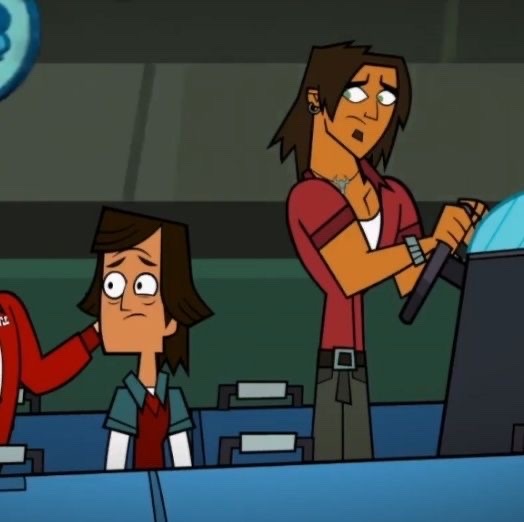
Welp, there you go. There’s my entire essay. If you disagree with something or have anything to add you can comment down below! But keep in mind this took 2.5 hours soo…
#total drama#fypシ゚viral#td alejandro#idk how to tag this#alenoah#td noah#personal essay#im not okay#tdwt#please help#lol#love these two#make them canon#fypppppppppppppppppppppppppppppppppppppppppppppppppppppppppppppppppppppp#tumblr fyp#fypage#this took way too long
60 notes
·
View notes
Text
Daemons To Systems, And The Ways They Intertwine
Hey, I’m Max, he/they - I’m the host of our system, the guy who lives in the front and has only ever lived here, the one who identifies our body as my body specifically. A few nights ago, we realized something about our system origins while talking to some other systems, and I’ve honestly never heard of it happening before, so I thought I’d talk about it.
I used to think that I was a singlet before Jude and Gavin walked in. Now I’m pretty sure I wasn’t. See, before I was the host of a system, I was a daemian. I had three daemons, over the course of my time practicing daemonism, interacting with the community. And they were all a little weird.
The first one was Charlie, affectionately longformed as Charlemagne. Xe appeared in January 2018 as a red fox, said that was xir settled form, and never changed from that. That’s an option for daemons - I know other daemons who chose their forms, independent of how well that form represented their daemian, and stayed that way - but it was in contrast to how most people seemed to do it. I never really felt the need to find a form that fit my personality, not when xe was so confident that this was what xe was.
I didn’t try to make xir do anything, I didn’t decide to give xir faux autonomy - xe just did things xirself, with or without my prompting. Xe was playful, optimistic, a cheerful presence always willing to race around and perk me back up. I really needed xir, back then - I was going through a lot of stress in high school, and I needed someone around to remind me of the whimsical little joys in life. Xe fronted sometimes, and I loved when xe did, conjured phantom tail and paws and big fox ears and an unstoppable zest for life.
My next daemon, Martin, appeared in May 2019 after a fever dream. Really. I was sick and tired and miserable, and I didn’t want to do anything, including things that would make me feel better, and a new internal voice appeared in my head. She told me to drink some water and get to sleep. The next morning, she was still there, lounging around as a large black dog, and she stayed.
This became her role, her purpose in our mind, being a shepherd for my needs. She ran our faulty executive functioning, told me to take care of myself when I forgot important things, encouraged me when I failed to meet expectations. She raised her hackles when anyone tried to overstep our boundaries, and advocated for doing what we needed to protect ourselves, regardless of whether it was nice or polite.
Charlie and Martin overlapped in existence for a while. Charlie loved having a big sibling to play with, and Martin was fond of xir. So I had two daemons for a while, and the arrangement was nice. As I transitioned out of high school into college, my circumstances and environment drastically changed. Charlie was sweet, but xe stopped having a function in my life, so over the months, xe popped up less and less, until xe faded away entirely. Xe wasn’t upset to go, and xir memory is a comfort to me - xe served xir purpose, brought me joy, and had a life well lived.
In October 2021, I created a new daemon, compartmentalizing my emotional dysregulation and disordered anxiety into something that was Not Myself, so I could talk to it and understand its needs without being overwhelmed with distress. This became the feral shadow of a dog that we named Cortisol, nicknamed Court - and if Martin was our Freudian superego, who provided guidance for my decisions and stability when I got stressed, Court was our id, feeling all the explosive emotions that I couldn’t externally express and curling up for scritches like a beloved pet when it got what it needed.
We stayed like that for almost a year, getting familiar with the rhythm of life together. Then, in August 2022, my current headmates walked into my brain. My daemons vanished for the duration of their stay.
They only stayed around a few days, that first time - I was moving to a new place and having new people in my brain simultaneously was overloading our mental RAM, so I was forgetting a lot, and I decided that I’d rather live with them some other time. They understood, we said our goodbyes, and they walked out the next morning. (Recounting this to my friend Tanix was hilarious, by the way. “what the fuck (positive)” he said, his own headmates unable to do this. The joys of being a gateway system.) Once the headmates were gone, my daemons returned into my life.
They came back in March 2023, after I settled down into college for a while, and the memory didn’t jam up like it did previously, so we didn’t part ways this time. Martin and Court vanished overnight, again, and looking back on it, I’m noticing some patterns.
Gavin is basically performing the same role that Martin did - he’s the guy reminding us about our responsibilities, talking through the emotions when we feel like garbage, telling me to eat when I forget, or encouraging me to eat when I have enough sensory issues that I can't stomach anything. He consistently fronts when talking to people we don’t especially like, because he feels protective of us and tends to be the most patient with annoyances.
He’s also literally just some guy, just a decent human person who wound up in here because his partner arrived in my brain five minutes before him and understandably got really upset about it, so he followed them in. Somehow. We don't know how it works, but I also don't know exactly where the first two of my daemons came from, so I’m fine leaving it as a mystery.
(He has a lot of complicated feelings about the position he's in, playing a daemon’s role as a completely different person from me, and will probably write his own post about it some time.)
Jude is, unfortunately, kinda in the same role as Court. And since Court held the emotional dysregulation in my brain, Jude also holds the grand majority of the distress and anxiety that we feel on a regular basis. We all really wish it was split more evenly, because Jude tends to not only lose the ability to talk when they panic, they also get stuck in the front, completely unable to talk to me or Gavin.
(It’s not even that they feel the stress that directly affects them, it’s that on top of the stress that we get in our daily life. They regularly had panic attacks over my grades and exams last semester, and they weren’t even the one studying for it at all! It’s fucked up and I don’t love it for us.)
And there are other interesting little coincidences. You know how Court was a sketched-in sort of black dog? Jude only really realized they related to dogs upon arriving in the system with me, and the archetypal form they identify with is, again, a stylized black dog.
It’s really interesting, the ways my brain decided to be plural, because I didn’t think I was a system back then. I had a daemon, then two daemons, and they were daemons because I considered them parts of myself - no matter how autonomous they were, we were bound together in the same identity, as parts of the same person. They were reflections of me, and I loved them like I loved myself, and they loved me with the same ferocity.
With this realization, that my daemons effectively merged into my system, I did have to ask - are my headmates also parts of me, since they’re falling into the same functional compartments in my brain? We don’t think so, or at least, we don’t think it’s that simple.
They’re completely different people from me, people who arrived here with their own lives and memories and identities. They aren’t autonomous reflections of my psyche like my daemons were. They’re my weird roommates who moved in with me, and my boyfriends, and I guess you could say we’re life partners - because hey, what’s a partner if not someone you share a life with? What’s more intimate than sharing the same body, hearing each other's thoughts and feelings? They aren't parts of me, but we live the same life together, and I think that counts as something just as significant.
54 notes
·
View notes
Text
“One turns at last even from glory itself with a sigh of relief.”
-Annie Dillard, “Total Eclipse”
#academia#chaotic academia#dark academia#classic academia#literature#uni#aesthetic#college#english literature#lit#dark acamedia#dark acadamia aesthetic#light academia#academia aesthetic#academics#chaotic academic aesthetic#romantic academia#essay writing#personal essay#essay#read#reading#annie dillard#eclipse#total eclipse#moon#sun#terrifying#amazing#read it
42 notes
·
View notes
Text
Alright, ya gremlins: it's finally here.
After writing and rewriting this essay five or six times over the last month and a half, I've finally settled on a version I think I like — meaning I think I've finally figured out how to articulate what's been on my mind.
Katsuki Bakugou holds a very specific place in my heart. I reckon writing this long ass essay in earnest may be considered pretty "cringe" by some standards, but honestly, I found it very cathartic. Maybe I need to touch grass. Or maybe, fiction can sometimes just be another tool we use to understand ourselves.
Which is to say: looking at angry kids like Katsuki feels a lot like looking at myself.
#writeblr#essay writing#writers on tumblr#katsuki bakugou#bakugou katsuki#mha manga spoilers#katsuki bakugo mha#mitsuki bakugou#anger issues#ptsd rage#ptsd recovery#healing journey#grief#inner child#self forgiveness#personal essay#my inner child is angry as fuck#and tbh i don't blame him#but i wonder what he'd think of me
29 notes
·
View notes
Text
Love & Process: blue (2002)
Hello to everyone reading, and welcome to a highly belated attempt to squeeze some of my thoughts and emotions through some semblance of a creative process and onto a page. Today, I want to introduce this blog by talking about a lovely film, blue (2002), directed by Hiroshi Ando and based on a manga by Kiriko Nananan.
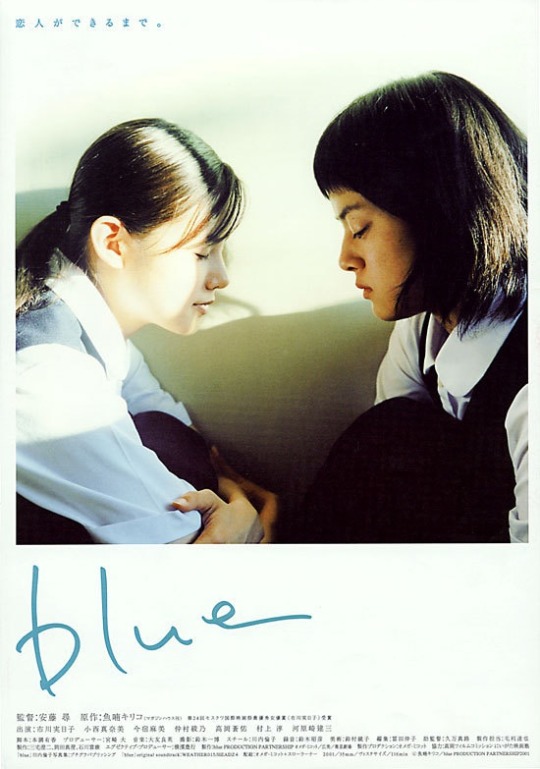
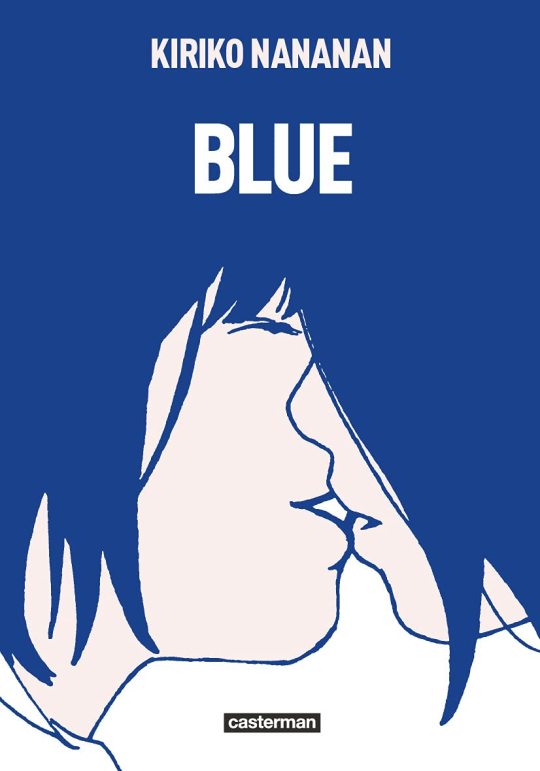
Since I'm still somewhat new at diving into live action film, especially, like, uh, Japanese indie film, its helping to start with the yuri genre. Because like practically any other woman on this site, I quite enjoy lesbians. blue's manga original offers something of an alternative to the yuri norm, though, and the film follows suit. Both are definitely examples of the Japanese filmmaking trend I've heard of called "mumblecore," (or maybe mumble-komi for the manga equivalent) that most people know through the likes of Inio Asano's early work. Like Solanin or Girl on the Shore, blue is shoegazey, quiet, and contemplative, adorned with moments of subtle physical intimacy, layered emotion, and stunningly beautiful compositions of daily life.
My metric for these kinds of slow mood pieces, which I've previously tended to watch at random whenever the mood struck me, is that if my barely-medicated ADHD brain can even finish them, there's clearly something special going on. blue passed with flying colors; yeah, ok, it took two sittings, but I spent all of both enraptured, immersed, and invested in the mono no aware of silent, fragile love and messy asymmetry that formed this movie's emotional palette. blue is about love, of course, but its also about process and expression, both emotional and creative, and how processing things, artistically, verbally, non-verbally--is often required of real, human love.
In being about this, I think it did things for me that a lot of yuri often doesn't and gently hit me in a place that I really needed to be hit. So, let me get into it. This is going to be...very personal, and also obviously spoil the details of the film, if you care about that, although I'm sure there will be plenty of depth left in the text that I leave untouched. Whether you read it or not, I'll be happy I made it. Oh, and sorry if I come off as really New for being so struck by themes and aesthetics that are probably sort of standard for this type of film. I can't help what I feel like writing about, though.
------------------------------------------------------------------------------
Kirishima Kayako lives in a small town by the sea, one much like dozens of other anonymous, disaster-prone exurban towns in Japan at the turn of the millennium. She rides the bus to her girls' high school every day, where she eats lunch with her friends and tries her best to learn something in class. Really, though, she's aimless, quiet, lonely, and introspective. She's trying, but its rare for others to be able to tell. She's also in love with her classmate, Endou Masami. When she confesses at the end of the first act, on a windy beach against the vastness of the ocean, Endou responds that she's glad, and the two become our lesbians for the movie. Kayako falls to her knees and cries in relief. Masami is different from the others--she sees how hard Kayako tried. Does that mean she loves her back, though?
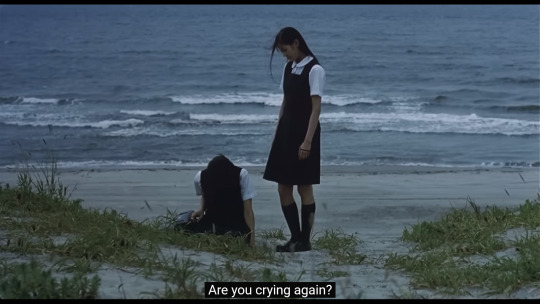
Endou Masami has cool passions and interests; she collects American CDs, which she expertly critiques and describes while lending to friends. The mere view of her vibing to her American alt-rock while smoking a cigarette in front of her apartment window is album-cover worthy in itself. Kayako feels the same way: one of the most intimately gay scenes of the pre-confession portion of the film is when Masami lights a cigarette and asks if Kayako is shocked. The quiet girl declares without hesitation, "No, I'm admiring the way you lit the match."
The whole early film is such a delectable, lonely vibe. The slowly intertwining couple's solidifying dynamic is the kind that forms between an emotionally complex introvert and the perhaps even more unknowable yet somehow more confident object of their affection. The two are classmates, (there's no classic yuri kouhais and senpais here) but for the early part of the film we are seeing things from Kayako's perspective and Masami seems unmistakably older in spirit. There's something about the dense emotions conveyed in her gazes at her new girlfriend, the almost world-weary tinge of recklessness in her distant grins. She talks about music Kayako's never heard of and lends out books with Romantic-era paintings that she has well-formed thoughts on. Kayako even openly admits that if she could, she would want to be Masami.
I think we've all loved a girl like that.
It's a pretty typical experience in middle school or high school, for really anyone lonely who loves women, to be drawn to these sorts of sad, beautiful, oh-so-seemingly-complex femmes. I guess straight men have a similar thing going on with the whole Manic Pixie Dream Girl archetype, but for us women (or, women-to-be, at the time, I guess), the phenomenon of these people to us often involves a sort of existential jealousy. I'm not sure what is so alluring to other people about the sense that the object of their love has Something Going On that they are working through, or a vast and complicated life beyond the scope of one's understanding, but it me it always felt like something I was missing out on for myself. Obviously, a lot of their experiences and interests must be interesting and fun and super cool, you think, but even what pain you think they convey must be somehow more edifying than yours.
For me, the edifying aspect was the mere fact of femininity itself. The idea of a girl who has deep and Real emotions, who feels Real love and Real sadness and can actually express that in how she looks, beautiful and imperfect, always threw into stark contrast my own inability to express myself comparably. I was depressed, I was growing up, and I felt things, too, but, as someone who everyone thought was a straight boy and who was too scared to admit to being otherwise, I lacked that sort of beauty, that means of expressing what was inside me through fashion, makeup, book or music knowledge or taste. Or at least I thought I did. Thus, my own emotions must have also meant less. So, I ignored them and belittled them, and entire years passed before I processed a thing correctly. I always wanted to be some other girl. That was the only thing that would fix me.
I assume that the teen (and, uh, sometimes beyond) existential pining experienced by some other people in real life usually lacks the fun bonus that mine had of a screaming void where my femininity should have been, but I'm not sure how much this actually matters to the crux of the kind of experience I'm talking about. That some kind of void is there is all that matters, really, and its there for Kayako in her relationship with Masami at the beginning of the film. She has nothing, Masami is everything, and just being close to her is enough, for now. Just being noticed, just sharing something with her, is all Kayako feels like she can ask for.
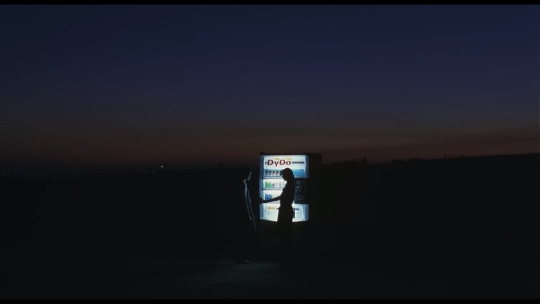
Of course, this incomplete way of seeing love can't last, which brings us to the next part of the film, which starts when the two are hanging out and Masami reveals through a guarded, distant grin that she had an abortion a while ago. This isn't something that shocks Kayako or is really meant to shock the audience, and it isn't the big moment where she forced to reconsider her feelings. Rather, she asks how it went, and Masami responds honestly. She mentions she felt horrible the next day and had to be picked up by ambulance from the nurse's office, prompting Kayako to recall silently what to us was the film's first scene, a view from her window during class of an anonymous ambulance, sirens turned off, discreetly rescuing a student.
That she had this ambiguously traumatic, and at least unpleasant and potentially taboo experience is something that could have made Masami feel even older to Kayako, her pain even more distant and obscure. It certainly already is a way that Masami herself feels distant from others. Yet, by considering her own special, observant view of the ambulance back when it happened, it becomes one that Kayako can in some small way assertively share with her. Rather than continuing to put her lover's experiences on a pedestal, Kayako in this scene makes a silent decision to turn a blossoming mutual acceptance simply that they happened into a moment of true intimacy between the two, a sleepover punctuated by smirking kisses and satisfied cuddles initiated by each of them for the other. Despite her remarks that Kayako is weird for unhesitatingly wanting to stay with her, its an intimacy that Masami is happy to accept. This is all an important turning point in Kayako's development because she begins to choose insight, closeness, and assertion over the distant admiration that trapped her earlier.
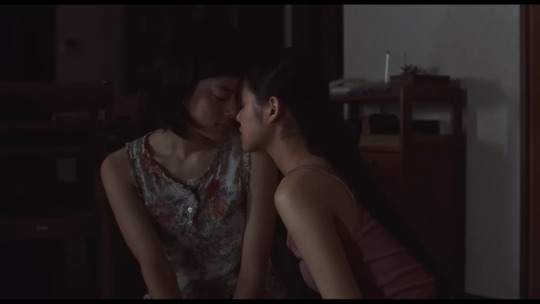
As we go on, we'll start seeing how blue's gentle impact comes from the way it doesn't glorify or sugarcoat that earlier kind of unhealthy and immature dynamic. Instead it subverts it by giving Masami depth and Kayako agency, before reaching an endpoint that reflects on how the dehumanization of that kind of depressed, pining relationship can be overcome. In that sense, blue is a yuri romance mostly about the couple coming to accept their own and each other's humanity and capacity for expression. Like any good mumble movie, its full of long silences and almost unrealistically hesitant dialog, and doesn't give any explicit internal monologues like a lot of manga do. The world of this movie is one where expression is an uphill battle, something that has to be worked towards and struggled through. It's the world that Kayako and Masami share, in their own separate ways. And that's why its such a triumph to watch Kayako finally find her voice, her passion, and her process, which all starts in this scene.
First, though, it's time to learn about the Something that Masami has Going On.
Things begin when Kayako is still sleeping. Masami gets a call on her house phone that she doesn't answer, but that sends her into a silent spiral of emotional dread. She spends the next day at school in the nurse's office, refusing to tell Kayako what's going on and confiding only in her friend Nakano. Then, when summer break comes along, she disappears, leaving Kayako alone at home, pouring silently over the book of still life oil paintings that Masami lent her.
It ends up being Nakano who tells Kayako why she left. It's the story Masami didn't tell about the source of her abortion: an adult, married man whom she had a relationship with and eventually a pregnancy from. She got things taken care of without telling him, alerted her parents and tried never to see the rotten salaryman again. That is, until he called. He wasn't getting along with his wife anymore, apparently, and she had some sort of attachment to him that made her come running back. Her taste in music originally came from him, after all. It seems that, for the time being, her devotion to this mysterious, abusive man is going to perpetuate a brutal cycle: she'll keep hurting both Kayako and herself all at once.
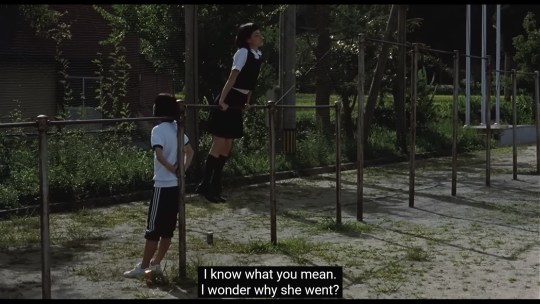
What really destroys Kayako and her relationship, though, is that she lies about it. When she comes home after some predictably rough interactions with this guy, she tells her supposed girlfriend that she was enjoying a vacation with friends, and even gives her some grapes, supposedly grown in the prefecture she was hanging out in, as a twisted souvenir. The more assertive Kayako enforces her boundaries without hesitation, though, in equally as blunt a tone as she complimented her love, as when she told her she wanted to stay with her, all those nights ago. "Why are you lying to me?" Its with that same grin, now tinged with emotionally oblivious deception, that Masami dares to at first first feign ignorance.
"Eh?" Her smile is shallower than its ever been.
So Kayako walks away.
Their dynamic has now become worse than just immature; it's entirely toxic. From an outside perspective, Kayako is working on her shortcomings, while Masami refuses to reconcile her past. This kind of toxicity, though, is sadly just as common in high school (and even sometimes middle school) as is the kind of misunderstanding, lonely pining I talked about earlier, just usually among different sorts of people. Appropriately, its often even that exact kind of beautiful, hurting, mature femme (in the eyes of disastrous, moody lesbians like Kayako) who is going through that sort of pain. Its that mysterious and tragic byproduct of compulsory heterosexuality that causes a lot of girls to seek validation in the love of an older man, and that I imagine becomes a sort of addiction to that validation that only masquerades as love. Hell, Masami attributes much of what made her seem so interesting on the surface, her love of music, to this guy. She feels like she'd be nothing without him, and the way Kayako praised her, at least in the way she interpreted it, did nothing to dispel this fear. Which I think is really why she decided to go back, even though it would mean betraying the very girl whose love provided her an escape from it all.
Its an ugly truth, and its one that yuri media usually shies away from portraying, but it is explored with refreshing frankness and resolved with astounding maturity by the end of blue. And I think its the source material's status as "alternative" (I guess in Japanese parlance, Garo-inspired) manga, not to mention the movie's simply as an independent film, that allows it to break with genre limitations in this way. There's been tons of writing done on how yuri definitely presents a fantasy of the sapphic experience. Mainstream yuri's origins in Class-S still to this day often cause it to portray romances between women as fundamentally different, and inherently more pure, than those involving men, trapping them in a bubble of unassailable innocence. While that kind of makes sense and seems extremely cool to those of us who celebrate having little interest in moids or whatever, it also has the effect of sugarcoating and sometimes even outright obscuring what real women, even (and sometimes especially) sapphic ones, go through.
There's already a decent amount of yuri, especially among those aimed at older demographics and those where its more of a secondary genre, that do deal with compulsory heterosexuality and the experiences that come with it. What are much rarer are yuri series where one of the lover's flaws more resemble Masami's than Kayako's. Not enough that I've read at least is willing to make its relationships messy, or have one of its leads just do straight up bad things like self-destructive cheating and lying.
Because, really, its the same as what Kayako went through, isn't it? The lonely longing for something more that feels like it can only be cleansed by denying oneself all one has and betting it all on being close to someone else. The only difference between the two's actions is temperament and perhaps socialization--one sought it from a cooler woman, the other from an older man. And somewhere out of sight, that sad, irresponsible, fucked-up adult was probably hopelessly lonely, too, just like Kayako had to accept Masami was. Maybe disaster lesbians, disaster bisexuals(?), and yes, disaster straights aren't so different after all.
Well, other than that Kayako has worked to process her feelings, while Masami went and ruined her relationship over them. That's an important difference. Still, though, even Kayako has some work to do about how she feels about all of this. Masami's pedestal has been smashed, whether she likes it or not, and now she's lonelier than ever. So where does this vampiric cycle of taking from others end? What substance can replace loneliness in this ouroboros of etropic emotional alchemy?
Kayako doesn't touch the grapes. Instead, she silently processes things, lies on the floor listening to the cicadas scream in the garden. The grapes go rotten, and her brother throws them out. She sulks for a while.
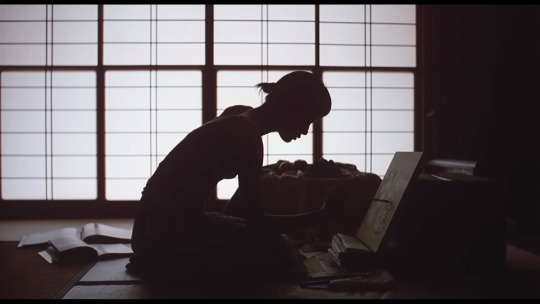
Then, she starts painting. A still life of grapes, inspired by the books that Masami lent her. At first, her drawing is lousy, as the school fine arts instructor later tells her, but the colors are gorgeous. The deep purples of the fruits are expertly layered to capture light and tell a story, one deeper than the instructor could possibly imagine. It's the story not only of the transformation of a relationship, but of the growth of one of its participants. As the hot, still air of the coastal Japanese summer cloys around her lonesome final vacation of high school, Kayako finally salvages a passion to call her own out of a floundering relationship. When school starts again and she picks up art classes, going to Tokyo for uni, a dream that was previously held only by Masami, starts to be within her reach. She has a future, an interest, and a way to process all has happened to her.
And then comes the time for Masami to try and return. She proves unwilling to address all that happened before, instead trying to kiss Kayako after school in the art room. Her undeserved attempt at intimacy is rejected with a shove, but so too is her self-pity that causes her to instantly run away. There's more that needs to be said that simply "I'm a terrible person." Kayako pursues her into the town's small shopping district as night begins to fall and neon crackles to life against a cool late summer night. Now the emotional climax of the movie begins.
First, Kayako starts talking. She tells Masami about the painting, about her summer, about how lonely she was without her, about all the places she wanted to go with her. She talks about how happy she was at the same time that she found something she wanted to do without her. This approach is new for her. She's never so far relied on words so heavily to express her emotions. When Masami points this out, Kayako says:
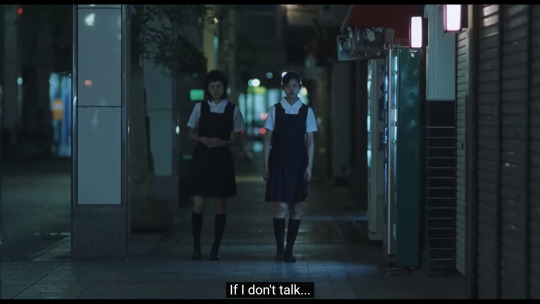
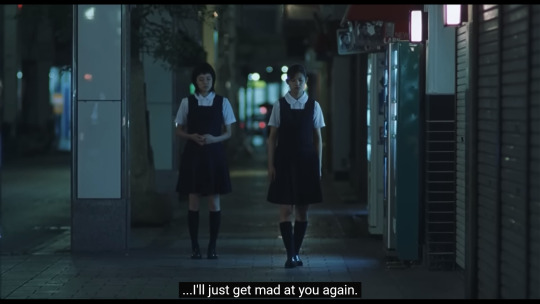
This is how she's choosing to process things for the time being. At first, it was being silent to carefully consider her emotions. Now, its speaking up to keep them focused on what she really wants.
Then, its Masami's turn, for the first time, to tell the truth. By now they're away from the small cluster of lights, staring out at the blackness of the beach where they first got together. Masami broke up with the guy, she says. But she also asserts that she came to his emotional aid to begin with because she felt his need for help was more important than anything else to her. She couldn't tell her girlfriend this before, because doing so would mean telling a truth she didn't think Kayako could bear to hear: that he meant more to Masami than she did.
Kayako already knows this, of course. And by speaking up to quell her justified anger, by weaving words like the deft strokes of honest color on the tip of a paintbrush, she's gotten herself to a point where she can accept it, too.
I mean, think about it. Masami is broke now; Kayako needed to buy her a sandwich so she wouldn't be hungry on their impromptu date. Her sabotaging drive to be validated and her inability to accept love from the girl willing to give it has, by all accounts, ruined her life for the time being and harmed those around her. Even though she broke up with the guy out of necessity, or out of some fleeting impulse to run back to Kayako, she still feels like nothing without him. As she says to Kayako later, now the envy runs in reverse--Kayako is passionate about painting now, while Masami will still amount to nothing. Despite it all, though, Kayako is willing to love her. She's called Masami out on what she needs to be, then decided to stay nonetheless.
"I always come second. You broke up with him, so the number one spot is vacant. When someone else comes, you'll put him there...
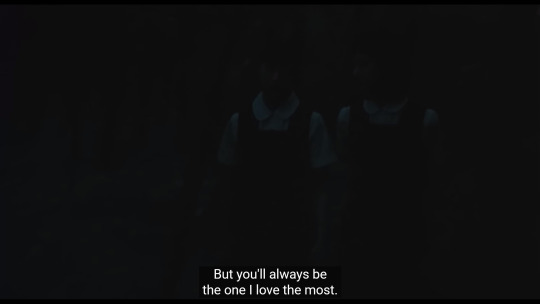
------------------------------------------------------------------------------
For most of my life, I believed that artistic expression was primarily the product of unrestrained, innate, and self-indulgent passion. I thought it was just something people either have or don't have, and that when they do, its something that can drive them to great heights of accomplishment and happiness otherwise impossible for humans to reach. It was mostly Japanese otaku media that instilled this into me, I think. I grew up exposed to a dizzying array of diverse and often miraculous artistic products that captured my imagination in ways the safe output of my own boring, monolithic home empire never did, and most of them were made by people who literally poured their lives into working on them. From Eiichro Oda's future-destroying, decades-long devotion to making One Piece to Kentaro Miura giving his life to practically paint the ceiling of the Sistene Chapel in pen on page after double-page spread in Berserk, to all of the hyper-passionate, universe-shattering early works of Hideaki Anno and his animator cohorts, I thought that I lived in a world of weird and wonderful treats whose cooks had the work ethic of demigods and the talent to match.
And even on the lower levels of the medium, among fan artists, cosplayers, writers, posters, historians, I felt surrounded by people who lived and breathed impossible passion, whose lives must have been defined by a kind of information processing my brain simply wasn't capable of. They had some ability to inhale the miraculous vapors of an abundant artistic landscape and spew out works of their own that further decorated the texture of a fleeting age of impossible marvels. And all that time, there I was, left on the sidelines, interested in many things but passionate about none, and lacking the motivation to really work to pursue anything at all. It was (and, honestly, still is) a state of existential discomfort similar to that sort of lonely-girl-pining, but doubtlessly far larger in scale. Some people had passion, while I had nothing to show for all my years of being alive. For fuck's sake, there was so much stuff out there, and I barely could muster the motivation to even read any of it most of the time.
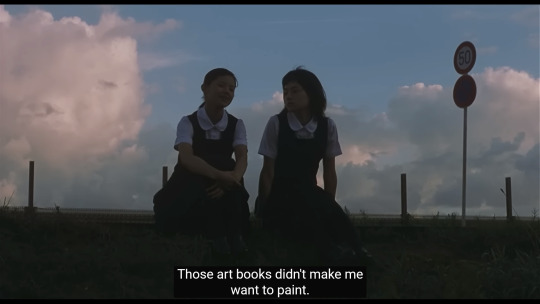
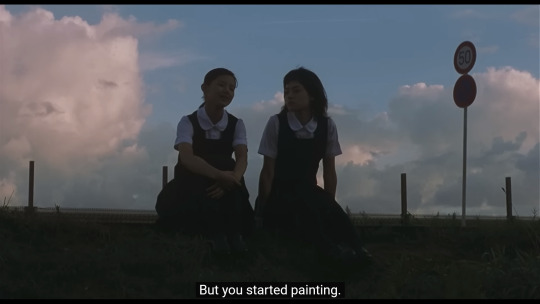
After a while, I started to feel like I was simply broken, like I was an empty person that didn't belong in the very world I loved living in. And while I think this might be a niche outlook and insecurity (although one represented, to my profound gratitude, in Masami), I think it's also how a lot of people think about love. Love is often portrayed as a feeling sparked entirely of instinct, one that, when a person truly feels it, will never cause them to make any mistakes or do anything fucked up to those they care about. Something that will drive those bolstered by it to impossible heights, improve lives beyond the sorrow and loneliness to which they are otherwise condemned. But, as Kayako learned and as Masami and I are having to find out, that isn't really the whole story.
Expression is love. Love is process. Therefore, expression is also the labor of putting love through a process, of rigorously trying to get your ass in a seat and put in the steps of putting your feelings into form. As this is required of art, so is it required of relationships. And so the two are a cycle. Creation requires emotions to process; relationships require emotions to be processed. And the love that creation inspires feeds itself into the love for others that inspires the emotion to fuel more creation. A Labor of Love. Again, I know I'm New.
But this is what Kayako has been working up to all movie long, first with her silence, then with some words, then with the labor of painting, the iteration of getting better, then with more words again. She has found a slow cycle that is elevating her above her loneliness, a cycle that Masami helped create, and is welcome within, but that can, if need be, exist without her.
Love, labor, process. Expression, creation, process. Creating, processing, choosing...in the end, to do it all again. To stay with what--and who--you have labored to love. And that is the choice Kayako has made.
I have not yet answered what, after thinking and writing about this movie for days on end, might be the substance that can replace loneliness as fuel for the alchemical cycle of emotional taking and giving. By the end of the lovers' reunion, sitting by the road under the slowly-illuminating blue of a haphazardly-clouded dawn sky, Masami doesn't feel like she has an answer, either. She feels small and hollow, manipulative and weak. She's jealous of the coping strategy her own girlfriend has developed to deal with the effects of her bad behavior. So, in the end, what is she? What is there even left for Kayako to love?
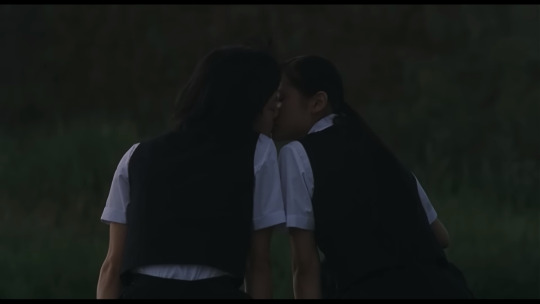
I'll be honest, this feeling is so fucking real I get perilously teary every time I think about it. Because, for as much as I mused about Kayako's feelings resonating with me as a former and sometimes girl-piner, when it comes to my current relationship at age 22, it's Masami in whom I see myself most clearly and brutally. It's hard not to when she is the only representation in romance, let alone in yuri, I have seen so far who is as much of a fucking brat as I am at times. Whose tendency to sabotage her own relationship makes it so asymmetric that what her girlfriend feels appears almost one-sided, but whose love is real all the same. If she lacks process, talent, maturity, mystique, if no one is ever going to be good enough for her, then what at all does she have left?
The answer to all of this is the thing that lies at the core of her being, that makes her who she is. The source of her potential to express herself, the starting point of a process yet to fully begin. It's hard to see, but it's there. Its what makes her Endou Masami. And its what Kirishima Kayako loves the most.
It's color. It's the thing at the core of creation that can't be described with words, that forms the motivation for any process. Its the vivid purple of a painted grape whose intentional creation transcends deception and nurtures discovery. It's the blue of a dawning sky whose light guides two girls in messy, lopsided love back into each other's arms. It's Kirishima Kayako. It's Endou Masami. It's what everyone has, and it's all anyone has.
It's the source of love, its process, and its object.
------------------------------------------------------------------------------
Eventually, Kayako has to leave for Tokyo. That's the decision that's best for her, and its a decision that, for the time being, will leave Masami behind in the countryside, hard at work on the process of learning to love herself. At the end of the film, she sends Kayako one final piece of proof of who she is. It's a painting of sorts, recorded on VHS, composed not of oil but of compressed light and sound. Stylistically, as the camera zooms in, it begins to resemble less Renoir and more Rothko: at first, its the beach, then, simply the point of the horizon, the area where the sea and sky meet. Its raw, not quite processed, pure color, vibrant blue, filtered and compressed into chunky, washed-out 800x600.

By way of description, "this is all I can do."
For years, I've struggled to believe that my emotions, hindered by depression and self-sabotage, have any value at all. As someone for whom love, passion, and expression have always felt difficult, even putting my thoughts down on a page, let alone drawing, painting, composing, or directing, has always seemed impossible. Recently, though, I've grown a lot. I've found the beginnings of a process learned to accept its existence. Both this process, and all the loves that go along with it, are often uncomfortable. They are painful and brutal and blissful things into which to pour the labors of communication and the torments of understanding. I've learned to process discomfort for the sake of creation, to create for the sake of love. It sounds cheesy, but again, I can't help what I wanted to write about.
I hope you'll join me as I find more new things and tough feelings I love to process on this account. There's so much more I'd love to say about blue, just for starters. I could talk about my undying appreciation for the work of Mikako Ishikawa, or how the shots in this movie are so gorgeous and evocative that I'd seen many of them before in "Japan in the 00s" vibes compilations.
But, until then, this is all I can do.
#japanese film#japanese cinema#yuri#yuri manga#lgbtq films#teen romance#pining#film analysis#personal essay#blue (2002)#kiriko nananan#mumblecore#long reads
86 notes
·
View notes
Text
The Dream Dragon Myth
Cross-posted from my dreamwidth, link in the title.
When others talk about resonating with films and media, there's often a divide between wilderness/nature vs city/industrial. Often nature is where the hearts lie for more feral inclined or beast-aligned folks. Dragons are usually among this group that are drawn to nature.
Through the breadcrumbs I've left myself, I can confidently say where my resonance lies in the media genre--folklore and fairytales. This also circles me back to my initial hesitance with the term folcintera. At first glance, I was unsure if it applied to me, merely seeing myself as a generic mythkind, simply a dragon.
However, after having terms to define my experience of having a kardiatype that is divinity-made-by-human and an archetype which is Mew that is a being that is mythical, little-l legendary, whimsical, mysterious, a bit mischievous and chaotic, as well as fluid, abstract both as a concept and as a creature--it all coincidentally aligns with me being a creature of dreams, chaos, vacillant in my shape, but definite in my draconity.
This realization of the self, myself, that is defined by my very own personal myth and folklore did not come from a singular instance of learning of the term folcintera, or interacting with media that are tied to fairytales or mythologies. This took time, and a certain level of self-acceptance, along with the unintended nudges from the communities around me via the discussion of alterhumanity.
I have contemplated that my otherkinity has some degree of voluntarity within. I as a species never quite make sense, even as a dragon, which tends to be from a conglomeration of other creatures. When I first had an idea of my appearance, it happened while I was within a draconic (and furry) community. I'd mentioned before that orange is as much a part of me as my draconity is. But what of all the other features that define me? From the bits I could recall of that community, the dragons are more typical of the scaled lizards with webbed wings, many have breath weapons of some sort. I remember a blue anthro dragon with military and firearm tied to the lore of their dragonsona.
Was it my desire to be different than the mainstream?
But looking back at my old drawings, most, if not all are decidedly random in their features. They'd either be some sort of snake with lots of extra, or hexapod being with claws for limbs and a pair of wings of various sorts, sometimes more, or avians with wings and legs combination, or they'd be piscine. Perhaps because of the media I grew up with, the draconic creatures are varied in their features, or perhaps due to my cultural upbringing.
I came from a background that has Buddhism, Taoism, some local folklore, and maybe Shinto or Shinto-influenced beliefs, and others that I cannot define. I grew up with my nonhumanity. I experience my life from my teens onward with the knowledge of my past life of being a dragon. I learn from a culture that acknowledges dragons as mythical and reality, and stories of dragons capable of shapeshifting, of controlling wind and rain. I read mythologies about dragons from many cultures of this world and their diversity.
When I had a complete image of myself, I was round, circular in shape, bright in colors, and dominated by orange so vibrant, you'd only possibly find it in birds, the fur of beasts, and wings of fowl. I also had a pet-like quadrupedal form, a form that is typically seen as an "eastern" dragon, and a form that is typically seen as a "western" dragon. There's not quite a point in mentioning the anthro shape, as I still do not think that is a form in itself.
There was not much separation between human vs nonhuman. I am nonhuman through and through.
As a whole, what is made up of me, my sense of self, the essence of my identity, is an amalgamation of all my experiences and knowledge, both intrinsic and potentially influenced by my surroundings. I am a dragon, it is the simple, unshakable truth. The how I am as a dragon is far more complex, it speaks of my story, my personal mythology.
#alterhuman#otherkin#nonhuman#dragonkin#folcintera#Dream Dragon Posting#personal essay#long post#essay writing#kardiatype#archetrope
27 notes
·
View notes
Photo

Rescuing the Rescuer: Saving Myself from a Lifetime of Hurt
In this moving essay, Cathleen Calkins examines the cumulative emotional toll on ski patrollers who witness and respond to traumatic injury every day on the job.
"The alchemy between rescuer and rescued is strange: like a romantic relationship, only faster moving. The euphoria of starting simply at hello, I’m here to help before moving on and culminating at what feels like deep attachment. We say my patient, as in they transported my patient to the hospital, or my patient opted to return to the slopes, or my patient is in the bar. I felt possessive of those I spent so little time with because our paths crossed at a moment they needed my help. Perhaps I cared too much.
I used to wonder how the people I’d assisted were doing. Like the college student who snagged first chair to get on the snow early so he could make it home before his afternoon class. He didn’t look like a skier. His cheap snow pants were too big, his cotton hoodie soaked. I remember how crumpled he looked when I skied up to him and how his inaudible moans grew louder when we secured him to the backboard. Had his injury prevented him from leading the life he wanted?"
Read Rescuing the Rescuer at Longreads.
523 notes
·
View notes
Text
Realizing I was AroAce

When did I realize I was AroAce?
It was in 1995, when I was eleven going on twelve. During that time, boys started liking girls (or boys), and girls started liking boys (or girls). And the conversations evolved to include discussions about crushes, dating, kissing, and gossip. And I was totally lost. Never had I experienced this thing called a crush, nor did I have any interest in dating or kissing anyone. For a little while, I thought everyone had lost their minds.
So I did what I always did when in a situation incomprehensible to me: I analyzed it to death. I wrote down all the incongruities between me and my peers. I never had a crush and had no desire to French kiss anyone. In fact, it sounded quite gross. Swapping spit with someone seemed unsanitary and unnecessary. But having their first kiss seemed to be the only thing the girls in my year wanted to talk about. And when they got older, the obsession turned to sex, which I really didn’t understand. Why would anyone want to engage in that activity other than for reproductive purposes? With these facts, I came to the conclusion that I didn’t desire sexual stuff. Since I didn't know about the existence of the word asexual, I invented my own: nonsexual.
I defined nonsexual as someone who doesn’t experience crushes or desire sex. I know that this definition is quite limited and only describes asexuals who are sex averse or sex repulsed. But at the time, I didn't know that asexuals could be either sex neutral or sex favorable.
Once I figured out what to call my lack of sexual attraction, I moved on to romance. I knew I felt no desire to go on dates, hold hands, or get married. The whole process seemed like a waste of time and effort. In the time it would take to go on a date with someone, I could have spent that time doing something more productive. Like washing my clothes or reading a book or playing a board game with a friend. And watching couples get romantic in front of me, whether in the movies or in real life, always gave me the ick. In all honesty, this entire romance thing truly baffled me. Since I didn’t know the term aromantic, I dubbed it nonromantic.
At the time, I defined nonromantic as someone who doesn’t experience romantic feelings toward other people. And surprisingly, this definition aligns pretty well with that of aromantic.
What was my reaction to being AroAce?
I just accepted it. Never did I feel a desire to fit in, and peer pressure never impacted me. I had a fiercely independent and strong-willed personality. Also, I always stuck out like an odd duck, and I just embraced this identity. What else could I do? I definitely didn’t know at the time that I had AuDHD.
And another factor, I had just started puberty and with that came gender dysphoria. I didn’t have the time or energy to freak out about both my sexuality and gender. And since gender had confused me the longest, that’s the one I continued to obsess over.
When did I discover the term AroAce?
While doing my undergraduate degree, I discovered AVEN and the term asexual. I also learned that sexual drive differs from sexuality and that the term “sex averse” described me the best. (Note: A sex averse individual doesn’t mind if others have sex; it’s just not for them.)
While doing my graduate degree, I discovered the term aromantic. I also learned about the different types of attraction one can experience. Shortly after that, I found the term that resonated with me the most: AroAce!
What was my coming out experience?
I don’t really have a pivotal “coming out” moment. When I realized that I was AroAce (nonsexual and nonromantic), I simply talked to my madre about it. She just accepted it. Then I talked to my padre. He didn’t understand it, but at the the same time, he didn’t make a big deal out of it. To be honest, I didn’t even know at the time I was doing a thing called “coming out”. I was simply sharing a discovery I made about myself, and I felt comfortable telling them about it.
Do I feel apart of the lgbtqia+ community?
When I first came out as AroAce (nonsexual and nonromantic), the initials were lgbt, and I didn’t realize that I belonged to the community. I didn’t realize this until I discovered AVEN. At uni, I tried to join a rainbow alliance, but the members didn’t consider me “queer enough”, so after attending one meeting, I didn’t return.
Now, I do consider myself apart of the community, but I still don’t feel comfortable entering queer spaces. I know that I shouldn’t allow my one negative experience to hold me back, but I do find it hard to get over past rejections because I have rejection sensitive dysphoria (ADHD). I’m working on it and one day, I may attend my first Pride. Who knows?
Do I want a queer platonic partner?
I don’t really know. Perhaps? But in my forty years, I haven’t met (in real life) another “out” person on the A-spectrum. So right now, it doesn’t seem likely. Mayhap in the future? I guess only time will tell.
And this concludes how I realized I was AroAce. If you have anything to add, please leave it in the comments. Until next time, take care and stay curious.
24 notes
·
View notes
Text

Big things are coming...
#my post#very pretty good#batman#damian wayne#dc comics#robin#batfamily#batfam#bruce wayne#talia al ghul#essay writing#personal essay#essay#video essay#literacy#literary analysis
45 notes
·
View notes
Text
Why “Plastic Beach” is a Masterpiece
I think something lost in a lot of music is an understanding of story. Music stemmed from the need to tell stories through verbalized communication that extended beyond speech. Morals, teachings, beliefs, were all told through stories, and then translated into song. Music is not music without the element of story. Even the simplest chord, can make one feel a thousand things.
It’s 2010 and I had recently moved into a new house. My parents played an album that I didn’t recognize while we are moving furniture into our new home. It had a very different sound from the normal Lumineers, Radiohead, Mumford and Sons, and Neil Diamond I was used to hearing played prevalently in my youth. “The revolution will be televised” ringing in my ears and I remember feeling a beat, very casual yet meaningful play that, even then, I knew was something deeper than one would think at first glance.
Even then, I knew something of a masterpiece was at work. See, what makes “Plastic Beach” by Gorillaz work is its asymmetrical narrative. The album starts with a fully orchestrated “overture” (if you will) that’s very rare in a predominately hip-hop album. This is what I liked to call “natural” music. All the notes are played like by instrumentalists through natural means. Yet, the album ends with completely electronic music. “Pirate Jet”, the finale, has very few real instruments playing in the song.
But, why is this important? Well, because “Plastic Beach” tells the story of a world where our beaches are filled with plastic, water pollution makes a man a giant, and the industry music is synthetic and fake. While a man, Russel (the drummer for the band), becoming huge cannot happen in the real world, a lot of the ideas and concepts mentioned within “Plastic Beach” are a perfect representation of the dangers of the modern day. The asymmetrical sound of this album represents the natural world (non-electronic music) and the polluted fake world (all electronic music). And slowly but surly, the entire album end’s completely electronic.
However, this is not a testament against certain genres of music. Gorillaz is very well known for a beautiful blend of electronic and traditional instruments within their music. So why choose this as an allegory? Well I liked to use my favorite song ever, that just so happens to be in this album, Melancholy Hill, to explain why.
Melancholy Hill explores the fake and synthetic world of the modern day music industry. While it’s gotten better over the last decade, when the album came out it was near impossible to do well within the industry if you weren’t conventionally attractive, used certain styles, and branded yourself a certain way. Obviously, there were outliers in this statement, however, I would argue that they had to work three times as hard to get where other big names at the time were. And many of these big names… didn’t make what Damon Albarn, co-creator of Gorillaz, saw as music. The lyrics were seen as nonsensical and two-dimensional and the music hardly used any music theory let alone skill within its works. It sounded fake. So, instead of bashing all electronic or pop music, he created a masterpiece that blended everything. Melancholy Hill uses both electronic and traditional music within the song, showing that neither music style should be ignored. A blend of both truly is perfect, in a certain way. Many of the best songs: Empire Ants, Rhinestone Eyes, Stylo, Broken, etc. on the album use this technique of mixing styles, and I think that was very intentional.
Everything above comes together to tell us this story: Technology and the modern world can be used to be create amazing and beautiful things. But, representing naturalistic ideas and our Earth which gives us life, is key to prosperity. We must protect it at all costs… and “Plastic Beach” by Gorillaz is the masterpiece that says it best.
#gorillaz#plastic beach#murdoc gorillaz#2d gorillaz#noodle gorillaz#russel gorillaz#electronic music#music#hip hiop#personal essay
70 notes
·
View notes